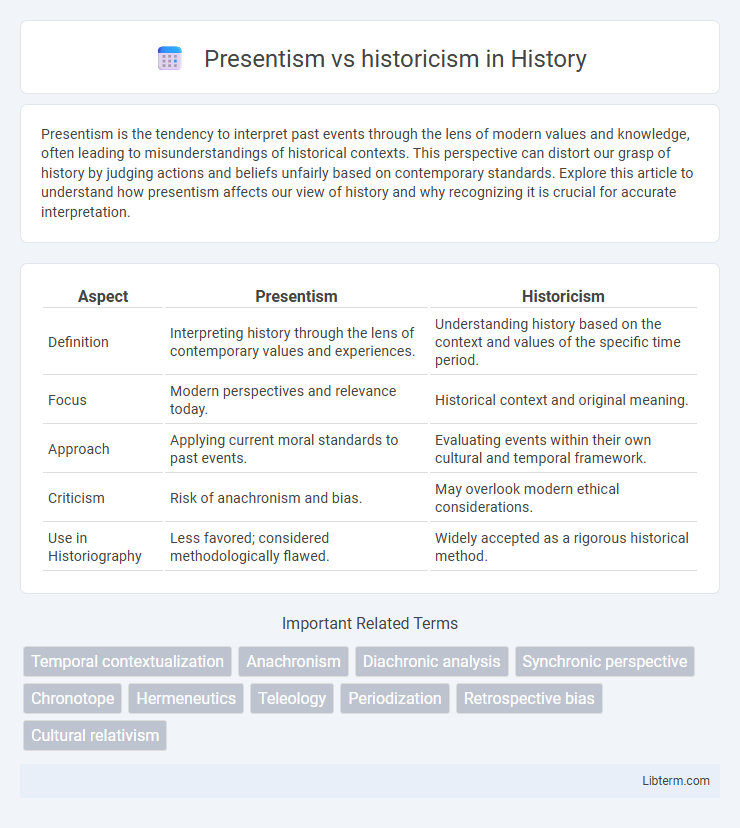Presentism is the tendency to interpret past events through the lens of modern values and knowledge, often leading to misunderstandings of historical contexts. This perspective can distort our grasp of history by judging actions and beliefs unfairly based on contemporary standards. Explore this article to understand how presentism affects our view of history and why recognizing it is crucial for accurate interpretation.
Table of Comparison
| Aspect | Presentism | Historicism |
|---|---|---|
| Definition | Interpreting history through the lens of contemporary values and experiences. | Understanding history based on the context and values of the specific time period. |
| Focus | Modern perspectives and relevance today. | Historical context and original meaning. |
| Approach | Applying current moral standards to past events. | Evaluating events within their own cultural and temporal framework. |
| Criticism | Risk of anachronism and bias. | May overlook modern ethical considerations. |
| Use in Historiography | Less favored; considered methodologically flawed. | Widely accepted as a rigorous historical method. |
Understanding Presentism: Definition and Origins
Presentism is the anachronistic interpretation of historical events through the lens of contemporary values and knowledge, often leading to biased assessments. Its origins trace back to philosophical debates about temporality, where critics argue that applying modern perspectives distorts historical context and authenticity. Understanding presentism is crucial for historians to maintain objective analysis and avoid conflating past realities with present-day beliefs.
Historicism Explained: Key Concepts and Development
Historicism is a methodological approach that interprets historical events by considering the cultural, social, and intellectual contexts of the time, emphasizing the uniqueness of each period. Key concepts include the rejection of present-day values as standards for analyzing the past, and the idea that history unfolds according to time-specific conditions rather than universal principles. Developed during the 19th century by thinkers like Leopold von Ranke and Johann Gottfried Herder, historicism shaped modern historiography by advocating for an empathetic and contextualized understanding of historical narratives.
Philosophical Foundations of Presentism and Historicism
Presentism asserts that only present events and entities exist, grounding its philosophical foundation in the ontology of temporal exclusivity and the reality of the now, emphasizing the flow of time as fundamental. Historicism, by contrast, is rooted in the principle that historical context and temporal distance are essential for understanding phenomena, positing that all knowledge is historically situated and shaped by past realities. These contrasting foundations highlight presentism's focus on the immediacy of existence and historicism's emphasis on diachronic development within the temporal continuum.
Presentism in Historical Interpretation
Presentism in historical interpretation refers to analyzing and evaluating past events through the lens of contemporary values, beliefs, and knowledge. This approach often leads to anachronistic judgments that may distort the understanding of historical contexts and motivations. Critics argue that presentism undermines the complexity of historical experiences and oversimplifies the diversity of past societies.
The Role of Historicism in Analyzing the Past
Historicism plays a crucial role in analyzing the past by emphasizing the importance of understanding historical events, ideas, and cultural phenomena within their specific temporal contexts. It rejects presentism, the anachronistic interpretation of the past through modern values or perspectives, advocating instead for a comprehensive analysis grounded in the social, political, and intellectual conditions of the time studied. This approach allows historians and scholars to reconstruct accurate historical narratives, avoiding distorted judgments based on contemporary biases.
Presentist Bias: Advantages and Pitfalls
Presentist bias, prevalent in historical analysis, interprets past events through contemporary values and knowledge, facilitating relatable and accessible understanding of history. This approach enhances relevance by connecting historical narratives to current societal issues, promoting engagement and reflection on ongoing cultural and ethical debates. However, presentist bias risks distorting historical context, leading to anachronistic judgments and oversimplifications that undermine accurate interpretation of past societies and their complexities.
Historicist Approach: Strengths and Limitations
The Historicist approach emphasizes understanding texts, events, or ideas within their specific historical context, enhancing interpretation by uncovering cultural, social, and political influences of the time. Strengths include promoting cultural relativism, preventing anachronistic judgments, and providing deeper insights into the evolution of thought and practices. Limitations involve potential relativism, risking the overlooking of universal truths and the difficulty of fully reconstructing past contexts with incomplete historical records.
Impact on Modern Historiography
Presentism distorts historical analysis by interpreting past events through contemporary values and perspectives, often leading to biased conclusions. Historicism emphasizes understanding historical contexts within their own time, fostering a more nuanced and accurate interpretation of events. Modern historiography increasingly balances these approaches, recognizing the influence of present-day viewpoints while striving to respect the complexities of historical contexts.
Case Studies: Presentism vs Historicism in Practice
Case studies in philosophy and historiography often highlight the tension between presentism and historicism by examining how current values influence the interpretation of past events. Presentism tends to impose contemporary ethical standards on historical figures, which can lead to anachronistic judgments, while historicism emphasizes understanding actions within their specific historical and cultural contexts. For example, debates around figures like Thomas Jefferson or colonial empires illustrate how presentist critiques clash with historicist efforts to analyze motivations and norms of their time.
The Ongoing Debate: Presentism or Historicism?
The ongoing debate between presentism and historicism centers on how historians interpret past events--presentism judges the past through contemporary values, while historicism emphasizes understanding events within their original context. This debate impacts the accuracy and bias of historical narratives, influencing interpretations of key moments such as the Enlightenment or colonialism. Scholars argue that balancing both approaches is essential for a nuanced comprehension of history, avoiding anachronism without ignoring the relevance of present perspectives.
Presentism Infographic

 libterm.com
libterm.com